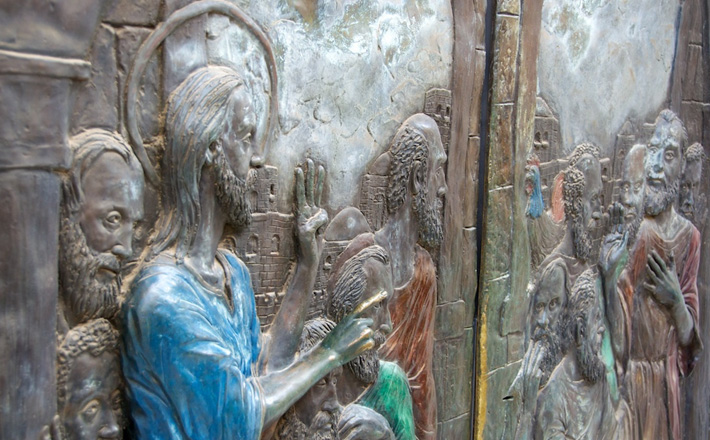Commentary on Psalm 31:9-16
One of the defining features of the prayer for help is the return to trust that defines its complaint.
Psalm 31 has both of these elements, and each is employed to full effect. These two elements go hand in hand, as the cry for help arises out of a place or state of deep need, and at the same time out of a sense or state of deep trust.
The complaint portion, of the portion of the psalm which makes up our reading, charts a place in which there is “terror all around!” (verse 13). The source of this terror is twofold, the physical distress of the psalmist, and her feeling that she is an object of scorn, dread, and the plotting of her enemies. The call for help emerges first from the psalmists “distress,” “grief,” “sorrow,” and miserable sighing (verse 10). This deep emotional distress manifests itself, as is often the case, in physical suffering: “my eye wastes…my soul and body also…my strength fails…my bones waste away.” And second, the call for help is uttered over the voices of those who see the psalmist’s misery, speak scornfully of him, and have begun to scheme against him.
The trust which is the balancing source of this cry for help is simple, yet profound. “You are my God,” says the psalmist, and “My times are in your hand….”
I am guessing that all of us know people (and are people) whose stories echo this struggling, yet surging faith. There are two particular phrases in this section of Psalm 31 that bring to mind stories that I trust will serve to illustrate the struggle and the upsurge of trust in the midst of life’s hard times.
“Those who see me in the street flee from me.”
We have long time family friends, from one of the parishes my father served. A number of years ago, this family lost one of their sons to an aneurism. It was unexpected, sudden, and devastating. This family had lived in the same small town for generations, they knew and were known by folks all over their county. But when their son died, something seemed to change. People grew distant, reserved, unsure. Not everyone, of course, but lots of folks.
One day as these grieving parents were walking along the small town’s downtown, they saw a member of their home congregation coming towards them down the block. This man looked up, saw them, and started to cross the street away from them. But in the middle of the street he stopped, shook himself, and turned back, walking straight towards them. He greeted them somewhat shamefacedly, and said, “I started to walk away, because I know you lost your son, and I didn’t know what to say. I’m sorry.”
This wasn’t scorn, or whispering, or scheming, but it was turning away from someone who was suffering; a kind of silence that is just as deadly and terrible. They had become “a horror to their neighbors, an object of dread…”
“My times are in your hands.”
Years ago, I was serving a little country church, Trinity Lutheran, in Sibley Township, MN.
My family lived in the parsonage next to the church, which had the cemetery spanning the length of the church property behind them.
My daughter Hannah, as a toddler, loved to play hide and seek among the headstones.
One Thursday morning as we were chasing around among the stones, Hannah literally stumbled across this one[i]:
Traugott Schlachtenhaufen
Born January 2nd, 1901; died October 18th, 1923.
“Der Meister ist da und rufet dir.” John 11:28
“Meine zeit steht in deinen handen.” Psa 31:16
I was struck, immediately, by that second Scripture quotation, because in one of those wild coincidences, the text that I was preparing to preach on the following Sunday, was from Psalm 31. So on that Sunday I shared the story of our discovery of that grave stone, and remarked on what a powerful expression of faith, even in the face of death, this was.
Little did I know. After worship, one of the old boys of the congregation asked me if I knew the story behind it.
Traugott Schlachtenhaufen had been a son of the parish pastor. He himself was a seminary student. While home from school, Traugott and his brothers convinced their father to go rabbit hunting. As the story goes, Pastor Schlactenhaufen, firing at movement in the bushes and thinking it was a rabbit, shot and killed his son Traugott.
After he had gone home, and, in his distress and misery, bent the barrels of his shotgun into a “U” on a workbench vice, the father chose this verse for his son’s gravestone: “My times are in your hands.”
How could he?
He could, because his Savior had. Jesus quoted from Psalm 31, one of his last words, “Into your hand I commit my spirit;” (Psalm 31:5). He could, because in the face of death, in the face of loss, he could do nothing else, need to do nothing else, than to trust the God who is steadfast in love, whose face is ready to shine upon God’s servants, and who first says to us “You are my beloved.”
The German poem at the bottom of the stone captures the tension between sorrow and trust that Psalm 31 encapsulates, and puts upon our lips:
“Was wollt ihr Euch betrüben, Why are you troubled,
Daß ich zur Ruh gebracht? that I am brought to rest?
Seid still, Ihr, meine Lieben, Be still, my beloved,
Gott hat es wohlgemacht!” God has made it well.
Notes:
[i] Image of Traugott Schlachtenhaufen grave marker © Karl N. Jacobson.



April 9, 2017